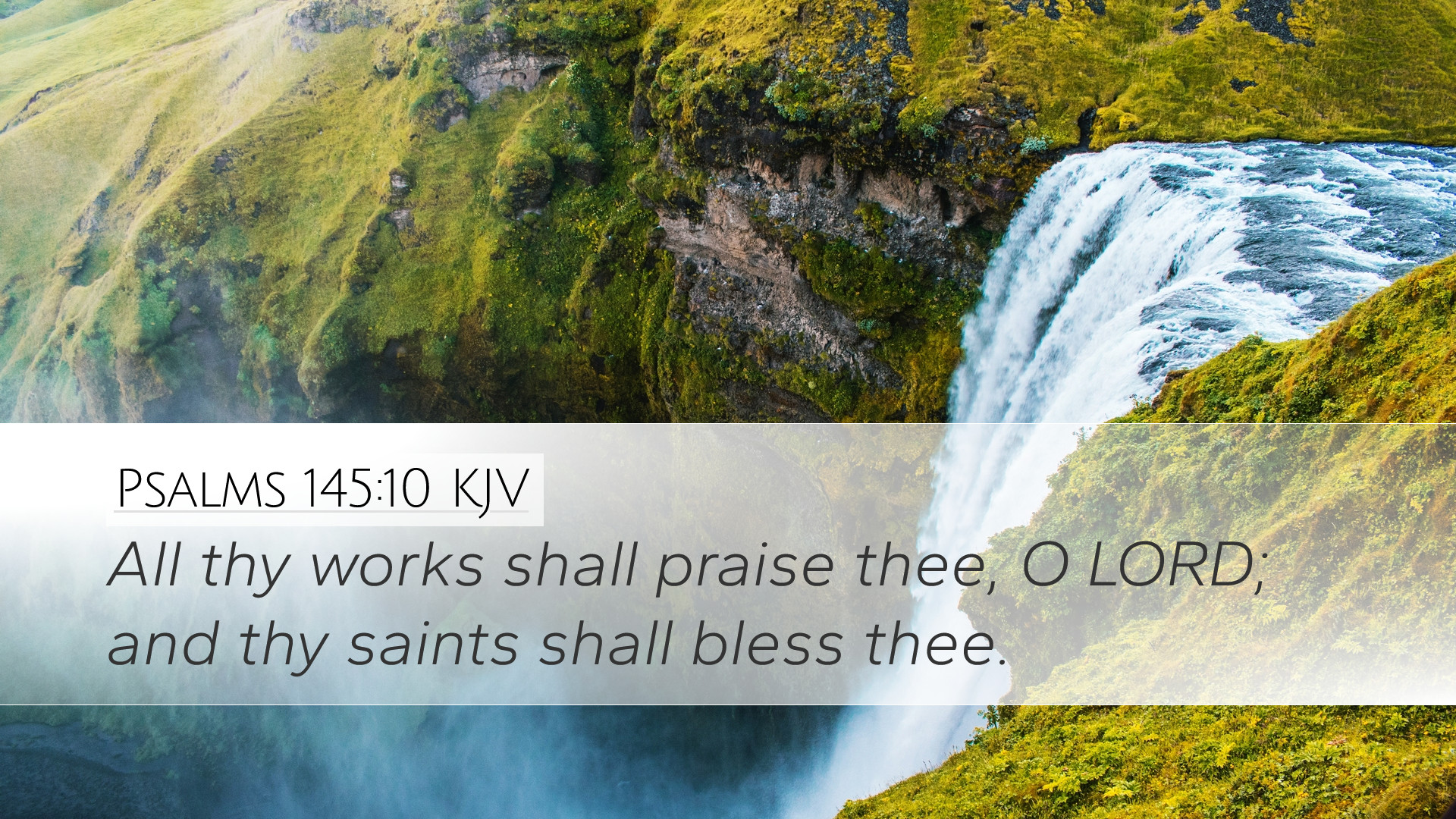Psalms 145:10 - A Commentary
Verse (Psalm 145:10): "All thy works shall praise thee, O Lord; and thy saints shall bless thee."
Introduction
The 145th Psalm is a magnificent acclamation of the greatness of God, celebrating His majesty, grace, and goodness. This particular verse, Psalm 145:10, encapsulates a profound truth about God's creation and His people.
Contextual Analysis
The psalm is attributed to David and serves as a public declaration of God's everlasting greatness. It demonstrates a call to worship, emphasizing that all creation acknowledges the Creator's glory. Here, David transitions from a personal reflection on God's greatness to a universal proclamation of His works.
Commentary Insights
Matthew Henry's Commentary
Henry notes that this verse illustrates the universal nature of praise. He emphasizes that all of God's works—from the majesty of creation to the smallest aspects of life—reflect His glory. The phrase "All thy works shall praise thee" highlights the inherent ability of creation to glorify God, showcasing His handiwork through nature and humanity.
Albert Barnes' Notes
Barnes expands on the notion that the entire creation operates as a chorus of praise to God. He identifies that every act of God's providence, every display of His power, and every demonstration of His mercy contribute to this praise. According to Barnes, the recognition of God's glory is not limited to words but is seen in the actions and existence of all living things. Furthermore, he underscores the role of His saints—believers who actively engage in blessing and praising God, reflecting their relationship with Him.
Adam Clarke's Commentary
Clarke elaborates on the distinction between works and saints. He articulates that all creation (the works) praises God outwardly, while the saints (the righteous) bless Him in a more intimate, conscious manner. Clarke draws attention to the unique calling of the saints to articulate praise, encouraging believers to actively bless God through their worship and obedience. He asserts that this act of blessing extends beyond mere words and behaviors, revealing a heart aligned with God’s glory.
Theological Reflections
This verse invites deep theological consideration regarding the nature of praise. It invites believers to reflect on the interconnectedness of creation and the Creator. The constant praise from all works signifies a divine order where everything exists in relation to God, culminating in His glory.
- Creation's Declaration: Just as the heavens declare the glory of God (Psalm 19:1), so too does every aspect of creation—from the grandeur of mountains to the minutiae of cellular structures—reflect His majesty.
- Human Responsibility: The emphasis on the saints' role suggests a personal responsibility among believers. It prompts introspection regarding how one actively participates in worship and praise.
- The Nature of Blessing: Blessing God is not merely about verbal expressions. It involves a life that reflects His goodness and grace in every action and interaction.
Practical Applications
For pastors, students, theologians, and Bible scholars, Psalms 145:10 offers practical implications:
- In Worship: Incorporate a holistic understanding of God's glory in public worship settings. Encourage congregants to recognize their role in glorifying God through both community worship and personal practice.
- In Discipleship: Teach believers the importance of an obedient life that serves as a testimony of God's goodness to the world.
- In Creation Care: Highlight the theological significance of stewardship and environmental care, as all created things reflect God's glory.
Conclusion
Psalms 145:10 serves as a powerful reminder of the intrinsic value of praise that transcends mere words. It calls forth an acknowledgment of God's greatness inherent in all created works, while simultaneously urging His people—the saints—to bless Him actively and intentionally. As believers reflect on this passage, they are encouraged to embody a life of worship that continually praises God through actions and existence.


